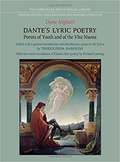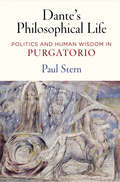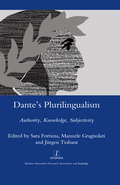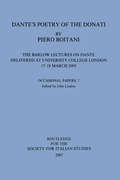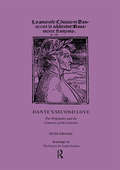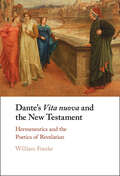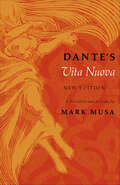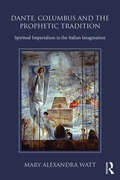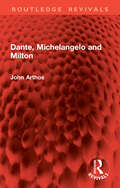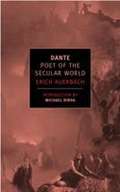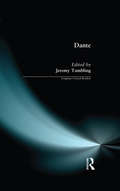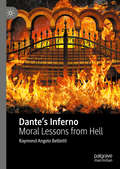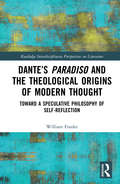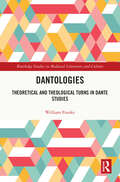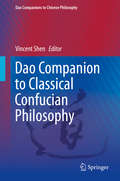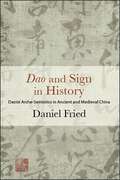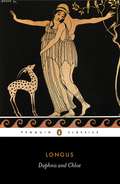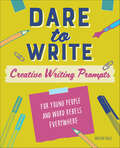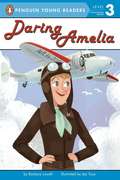- Table View
- List View
Dante's Lyric Poetry: Poems of Youth and of the 'Vita Nuova' (Lorenzo Da Ponte Italian Library)
by Teodolinda Barolini Richard Lansing Andrew FrisardiThe first comprehensive English translation and commentary on Dante's early verse to be published in almost fifty years, Dante's Lyric Poetry includes all the poems written by the young Dante Aligheri between c. 1283 and c. 1292. Essays by Teodolinda Barolini guide the reader through the new verse translations by Richard Lansing, illuminating Dante's transformation from a young courtly poet into the writer of the vast and visionary Commedia.Barolini's commentary exposes Dante's lyric poems as early articulations of many of the ideas in the Commedia, including the philosophy and psychology of desire and its role as motor of all human activity, the quest for vision and transcendence, the frustrating search for justice on earth, and the transgression of boundaries in society and poetry. A wide-ranging and intelligent examination of one of the most important poets in the Western tradition, this book will be of interest to scholars and poetry-lovers alike.
Dante's Philosophical Life: Politics and Human Wisdom in "Purgatorio"
by Paul SternWhen political theorists teach the history of political philosophy, they typically skip from the ancient Greeks and Cicero to Augustine in the fifth century and Thomas Aquinas in the thirteenth, and then on to the origins of modernity with Machiavelli and beyond. Paul Stern aims to change this settled narrative and makes a powerful case for treating Dante Alighieri, arguably the greatest poet of medieval Christendom, as a political philosopher of the first rank.In Dante's Philosophical Life, Stern argues that Purgatorio's depiction of the ascent to Earthly Paradise, that is, the summit of Mount Purgatory, was intended to give instruction on how to live the philosophic life, understood in its classical form as "love of wisdom." As an object of love, however, wisdom must be sought by the human soul, rather than possessed. But before the search can be undertaken, the soul needs to consider from where it begins: its nature and its good. In Stern's interpretation of Purgatorio, Dante's intense concern for political life follows from this need, for it is law that supplies the notions of good that shape the soul's understanding and it is law, especially its limits, that provides the most evident display of the soul's enduring hopes.According to Stern, Dante places inquiry regarding human nature and its good at the heart of philosophic investigation, thereby rehabilitating the highest form of reasoned judgment or prudence. Philosophy thus understood is neither a body of doctrines easily situated in a Christian framework nor a set of intellectual tools best used for predetermined theological ends, but a way of life. Stern's claim that Dante was arguing for prudence against dogmatisms of every kind addresses a question of contemporary concern: whether reason can guide a life.
Dante's Plurilingualism: Authority, Knowledge, Subjectivity
by Sara FortunaDante's conception of language is encompassed in all his works and can be understood in terms of a strenuous defence of the volgare in tension with the prestige of Latin. By bringing together different approaches, from literary studies to philosophy and history, from aesthetics to queer studies, from psychoanalysis to linguistics, this volume offers new critical insights on the question of Dantes language, engaging with both the philosophical works characterized by an original project of vulgarization, and the poetic works, which perform a new language in an innovative and self-reflexive way. In particular, Dantes Plurilingualism explores the rich and complex way in which Dantes linguistic theory and praxis both informs and reflects an original configuration of the relationship between authority, knowledge and identity that continues to be fascinated by an ideal of unity but is also imbued with a strong element of subjectivity and opens up towards multiplicity and modernity.
Dante's Poetry of Donati: The Barlow Lectures on Dante Delivered at University College London, 17-18 March 2005
by Piero Boitani"Members of the Florentine family of the Donati feature prominently in Dante's Divine Comedy . Their presence is explored by Piero Boitani, as a 'comedy' within the Comedy, in close readings of the three major episodes in which they appear, one for each of Inferno , Purgatorio , and Paradiso ."
Dante's Second Love: The Originality and the Contexts of the Convivio
by Peter Dronke"Three essays on the nature of the bonds between Vita Nuova and Convivio; the nature and significance of the Donna Gentile, Dante's 'second love'; and the imaginative and intellectual coherence of the third and fourth treatises of the Convivio . An excursus comments on the Donna Gentile's fate at the hands of scholars."
Dante's Tenzone with Forese Donati
by Fabian Alfie'And by now, mind, it's too late to redeem your debts by giving up guzzling.' Dante's poetic correspondence (or tenzone) with Forese Donati, a relative of his wife, was rife with crude insults: the two men derided one another on topics ranging from sexual dysfunction and cowardice to poverty and thievery. But in his Commedia, rather than denying this correspondence, Dante repeatedly acknowledged and evoked the memory of his youthful put-downs.Dante's Tenzone with Forese Donati examines the lasting impact of these sonnets on Dante's writings and Italian literary culture, notably in the work of Giovanni Boccaccio. Fabian Alfie expands on derision as an ethical dimension of medieval literature, both facilitating the reprehension of vice and encouraging ongoing debates about the true nature of nobility. Outlining a broad perspective on the uses of literary insult, Dante's Tenzone with Forese Donati also provides an evocative glimpse of Dante's day-to-day life in the twelfth century.
Dante's Vita Nuova and the New Testament: Hermeneutics and the Poetics of Revelation
by William FrankeModelling knowledge as revelation and theology as poetry, this powerful new reading of the Vita nuova not only challenges Dante scholars to reconsider the book's speculative emphases but also offers the general reader an accessible yet penetrating exploration of some of the Western tradition's most far-reaching ideas surrounding love and knowledge. Dante's 'little book', included in full here in an original parallel translation, captures in its first emergence the same revolutionary ferment that would later become manifest both in the larger oeuvre of this great European writer and in the literature of the entire Western canon. William Franke demonstrates how Dante's youthful poetic autobiography disrupts sectarian thinking and reconciles the seeming contraries of divine revelation and human invention, while also providing the means for understanding religious revelation in the Bible. Ultimately, this revolutionary unification of Scripture and poetry shows the intimate working of love at the source of inspired knowing.
Dante's Vita Nuova: A Translation and an Essay
by Dante AlighieriIn this new edition Musa views Dante's intention as one of cruel and comic commentary on the shallowness and self-pity of his protagonist, who only occasionally glimpses the true nature of love. ". . . the explication de texte which accompanies [Musa's] translation is instructively novel, always admirable. . . . This present work offers English readers a lengthy appraisal which should figure in future scholarly discussions." —Choice
Dante, Columbus and the Prophetic Tradition: Spiritual Imperialism in the Italian Imagination
by Mary Alexandra WattExploring the diverse factors that persuaded Christopher Columbus that he could reach the fabled "East" by sailing west, Dante, Columbus and the Prophetic Tradition considers, first, the impact of Dante’s Divine Comedy and the apocalyptic prophetic tradition that it reflects, on Columbus’s perception both of the cosmos and the eschatological meaning of his journey to what he called an ‘other world.’ In so doing, the book considers how affinities between himself and the exiled poet might have led Columbus to see himself as a divinely appointed agent of the apocalypse and his enterprise as the realization of the spiritual journey chronicled in the Comedy. As part of this study, the book necessarily examines the cultural space that Dante’s poem, its geography, cosmography and eschatology, enjoyed in late fifteenth century Spain as well as Columbus’s own exposure to it. As it considers how Italian writers and artists of the late Renaissance and Counter Reformation received the news of Columbus’ ‘discovery’ and appropriated the figure of Dante and the pseudo-prophecy of the Comedy to interpret its significance, the book examines how Tasso, Ariosto, Stradano and Stigliani, in particular, forge a link between Dante and Columbus to present the latter as an inheritor of an apostolic tradition that traces back to the Aeneid. It further highlights the extent to which Italian writers working in the context of the Counter Reformation, use a Dantean filter to propagate the notion of Columbus as a new Paul, that is, a divinely appointed apostle to the New World, and the Roman Church as the rightful emperor of the souls encountered there.
Dante, Michelangelo and Milton (Routledge Revivals)
by John ArthosOriginally published in 1963, this is a study of the greatness of Dante, Michelangelo and Milton, and of the differences in the power and effect of their work. This book shows how differing philosophical commitments help explain differences in the character of their greatness. The ancient treatise On the Sublime provides the starting point for these studies and in an introductory essay the author examines Longinus’ obligations to Platonic and Stoic philosophy. In the essays which relate the critical doctrines of Dante, Michelangelo and Milton to philosophy, he shows how far their thought accords with Longinus’ and to what degree they depend upon the same philosophic traditions. The final emphasis, however, is upon the relation of their ideas to the distinctive elements of their greatness.
Dante: Monarchy
by Prue ShawThis is the first new translation for forty years of a fascinating work of political theory, until now only available in academic libraries. Dante's Monarchy addresses the fundamental question of what form of political organization best suits human nature; it embodies a political vision of startling originality and power, and illuminates the intellectual interests and achievements of one of the world's great poets. Prue Shaw's translation is accompanied by a full introduction and notes, which provide a complete guide to the text, and places Monarchy in the context of Dante's life and work.
Dante: Poet Of The Secular World
by Ralph Manheim Erich Auerbach Michael DirdaErich Auerbach (1892-1957) is best known for his magisterial, and majestic, Mimesis: The Representation of Reality in Western Literature (published in German in 1946; English version, 1953). <P><P>This volume of connected essays opens by contrasting the ancient Greek and Hebrew worldviews, as revealed in the Odyssey and the Old Testament. It ends with a close reading of a passage from Virginia Woolf's To the Lighthouse. In the five hundred or so pages in between Auerbach offers searching analyses of short, illustrative extracts from Petronius, Gregory of Tours, Chretien de Troyes, Dante, Boccaccio, Shakespeare, Cervantes, Rabelais, Saint-Simon, Schiller, Stendhal, and others. <P><P>Building on the stylistic quirks, lacunae, and emphases in his carefully chosen authors, Auerbach reveals the underlying suppositions about what art should do and how people and events can be represented in prose at a specific moment in history. As a work of literary scholarship, Mimesis has been deeply and widely admired, occasionally criticized, and never equaled.
Dante: States Of Affect (Longman Critical Readers #18)
by Jeremy TamblingDante's work has fascinated readers for seven hundred years and has provided key reference points for writing as diverse as that of Chaucer, the Renaissance poets, the English Romantics, Tennyson and the Pre-Raphaelites, American writers from Melville through to Eliot and Pound, Anglo-Irish Modernists from Joyce to Beckett, and contemporary poets such as Heaney and Walcott.In this volume, Jeremy Tambling has selected ten recent essays from the mass of Dante studies, and put the Divine Comedy - Dante's record of a journey to Hell, Purgatory and Paradise - into context for the modern reader. Topics such as Dante's allegory, his relationship to classical and modern poetry, his treatment of love and of sexuality, his attitudes to Florence and to his contemporary Italy, are explored and clarified through a selection of work by some of the best scholars in the field. An introduction and notes help the reader to situate the criticism, and to relate it to contemporary literary theory. In this anthology, Dante's relevance to both English and Italian literature is highlighted, and the significance of Dante for poetry in English is illuminated for the modern reader.This book provides students of English literature and Italian literature with the most comprehensive collection of important critical studies of Dante to date.
Dantean Dialogues
by Margaret Maggie Kilgour Elena LombardiDantean Dialogues is a collection of essays by some of the most outstanding Dante scholars., These essays enter into conversation with the main themes of the scholarship of Amilcare Iannucci (d. 2007), one of the leading researchers on Dante of his generation and arguably Canada's finest scholar of the Italian poet.The essays focus on the major themes of Iannucci's work, including the development of Dante's early poetry, Dante's relation to classical and biblical sources, and Dante's reception. The contributors cover crucial aspects of Dante's work, from the authority of the New Life to the novelty of his early poetry, to key episodes in the Comedy, to the poem's afterlife. Together, the essays show how Iannucci's reading of central cruxes in Dante's texts continues to inspire Dante studies - a testament to his continuing influence and profound intellectual legacy.
Dante’s Inferno: Moral Lessons from Hell
by Raymond Angelo BelliottiThis book provides a recipe for healthy moral and personal transformation. Belliotti takes seriously Dante’s deepest yearnings: to guide human well-being; to elevate social and political communities; to remedy the poisons spewed by the seven capital vices; and to celebrate the connections between human self-interest, virtuous living, and spiritual salvation. By closely examining and analyzing five of Dante’s more vivid characters in hell—Piero della Vigna, Brunetto Latini, Farinata degli Uberti, Cavalcante de’ Cavalcanti, and Guido da Montefeltro—and extracting the moral lessons Dante intends them to convey, and by conceptually analyzing envy, arrogance, pride, and human flourishing, the author challenges readers to interrogate and refine their modes of living.
Dante’s Paradiso and the Theological Origins of Modern Thought: Toward a Speculative Philosophy of Self-Reflection (Routledge Interdisciplinary Perspectives on Literature)
by William FrankeSelf-reflection, as the hallmark of the modern age, originates more profoundly with Dante than with Descartes. This book rewrites modern intellectual history, taking Dante’s lyrical language in Paradiso as enacting a Trinitarian self-reflexivity that gives a theological spin to the birth of the modern subject already with the Troubadours. The ever more intense self-reflexivity that has led to our contemporary secular world and its technological apocalypse can lead also to the poetic vision of other worlds such as those experienced by Dante. Facing the same nominalist crisis as Duns Scotus, his exact contemporary and the precursor of scientific method, Dante’s thought and work indicate an alternative modernity along the path not taken. This other way shows up in Nicholas of Cusa’s conjectural science and in Giambattista Vico’s new science of imagination as alternatives to the exclusive reign of positive empirical science. In continuity with Dante’s vision, they contribute to a reappropriation of self-reflection for the humanities.
Dantologies: Theoretical and Theological Turns in Dante Studies
by William FrankeThis book comprises a searching philosophical meditation on the evolution of the humanities in recent decades, taking Dante studies as an exemplary specimen. The contemporary currents of theory have decisively impacted this field, but Dante also has a strong relationship with theology. The idea that theology, teleology, and logocentric rationalities are simply overcome and swept away by new theoretical approaches proves much more complex as the theory revolution is exposed in its crypto-theological motives and origins. The revolutionary agendas and methodologies of theoretical currents have ushered in all manner of minorities and postcolonial and gender studies. But the exciting adventure they inaugurate shows up in quite a surprising light when brought to focus through the scholarly discipline of Dante studies as a terrain of dispute between traditional philology and postmodern theory. On this terrain, negative theology can play a peculiarly destabilizing, but also a conciliatory, role: it is equally critical of all languages for a theological transcendence to which it nevertheless remains infinitely open.
Dao Companion to Chinese Philosophy of Logic (Dao Companions to Chinese Philosophy #12)
by Yiu-Ming FungThis book is a companion to logical thought and logical thinking in China with a comparative and interdisciplinary perspective. It introduces the basic ideas and theories of Chinese thought in a comprehensive and analytical way. It covers thoughts in ancient, pre-modern and modern China from a historical point of view. It deals with topics in logical (including logico-philosophical) concepts and theories rooted in China, Indian and Western Logic transplanted to China, and the development of logical studies in contemporary China and other Chinese communities. The term “philosophy of logic” or “logico-philosophical thought” is used in this book to represent “logical thought” in a broad sense which includes thinking on logical concepts, modes of reasoning, and linguistic ideas related to logic and philosophical logic. Unique in its approach, the book uses Western logical theories and philosophy of language, Chinese philology, and history of ideas to deal with the basic ideas and major problems in logical thought and logical thinking in China. In doing so, it advances the understanding of the lost tradition in Chinese philosophical studies.
Dao Companion to Classical Confucian Philosophy (Dao Companions to Chinese Philosophy #3)
by Vincent ShenThis volume presents both a historical and a systematic examination of the philosophy of classical Confucianism. Taking into account newly unearthed materials and the most recent scholarship, it features contributions by experts in the field, ranging from senior scholars to outstanding early career scholars. The book first presents the historical development of classical Confucianism, detailing its development amidst a fading ancient political theology and a rising wave of creative humanism. It examines the development of the philosophical ideas of Confucius as well as his disciples and his grandson Zisi, the Zisi-Mencius School, Mencius, and Xunzi. Together with this historical development, the book analyzes and critically assesses the philosophy in the Confucian Classics and other major works of these philosophers. The second part systematically examines such philosophical issues as feeling and emotion, the aesthetic appreciation of music, wisdom in poetry, moral psychology, virtue ethics, political thoughts, the relation with the Ultimate Reality, and the concept of harmony in Confucianism. The Philosophy of Classical Confucianism offers an unparalleled examination to the philosophers, basic texts and philosophical concepts and ideas of Classical Confucianism as well as the recently unearthed bamboo slips related to Classical Confucianism. It will prove itself a valuable reference to undergraduate and postgraduate university students and teachers in philosophy, Chinese history, History, Chinese language and Culture.
Dao and Sign in History: Daoist Arche-Semiotics in Ancient and Medieval China (SUNY series in Chinese Philosophy and Culture)
by Daniel FriedFrom its earliest origins in the Dao De Jing, Daoism has been known as a movement that is skeptical of the ability of language to fully express the truth. While many scholars have compared the earliest works of Daoism to language-skeptical movements in twentieth-century European philosophy and have debated to what degree early Daoism does or does not resemble these recent movements, Daniel Fried breaks new ground by examining a much broader array of Daoist materials from ancient and medieval China and showing how these works influenced ideas about language in medieval religion, literature, and politics. Through an extended comparison with a broad sample of European philosophical works, the book explores how ideas about language grow out of a given historical moment and advances a larger argument about how philosophical and religious ideas cannot be divided into "content" and "context."
Daphnis and Chloe: Introduction, Greek Text, Notes (G - Reference,information And Interdisciplinary Subjects Ser.)
by LongusA tender novel describing eager and inept young love, Daphnis and Chloe tells the story of a baby boy and girl who are discovered separately, two years apart, alone and exposed on a Greek mountainside. Taken in by a goatherd and a shepherd respectively, and raised near the town of Mytilene, they grow to maturity unaware of one another's existence - until the mischievous god of love, Eros, creates in them a sudden overpowering desire for one another. A masterpiece among early Greek romances, attracting both high praise and moral disapproval, this work has proved an enduringly fertile source of inspiration for musicians, writers and artists from Henry Fielding to Jean-Baptiste-Camille Corot and Maurice Ravel. Longus transforms familiar themes from the romance genre - including pirates, dreams, and the supernatural - into a virtuoso love story that is rich in insight, humorous and ironical in its treatment of human sexual experience.
Dare to Invent (Reach Into Phonics Ser.)
by Deborah J. Short Paula Singh Grace WuNIMAC-sourced textbook
Dare to Write: Creative Writing Prompts for Young People and Word Rebels Everywhere
by Kristen FogleKickstart your creativity and free your inner writer—writing prompts for teensWhat story do you have inside? Is it a romance, a drama, a fantasy…or all three? Dare to Write is here to inspire you with a huge variety of writing prompts, plot beginnings, and thought-provoking ideas. Scribble directly in the book or use your own notebook—the right way is however you want to write.You're invited to capture your thoughts and feelings using these writing prompts. Dare to dive into the character worksheets, topic brainstorms, or three-minute challenges and see what unfolds. You can crack open any chapter you like, or start with the first writing prompts in the book.Dare to Write: Creative Writing Prompts for Young People and Word Rebels Everywhere includes:A genre buffet—Try a taste of any of the included genres: memoir, poetry, crime fiction, romance, or fantasy/science fiction.Refresher inside—A handy intro and strategic writing tips help you brush up on basics like characterization, setting the scene, and more.Something for everyone—This is YOUR story! No matter what type of writer you are, you'll find creative writing prompts to inspire your composition.Pick up the writing prompts in Dare to Write—your imagination will take it from here.
Daredevils: 21 Stories of Outrageous Exploits (Critical Reading Series)
by Henry Billings Melissa BillingsThis best-selling series motivates students with high-interest selections at a higher readability level. Emphasis is on reading nonfiction, answering critical thinking questions, and preparing students for state and national tests. Critical Reading , a perennial favorite for middle school and high school students of all ability levels, fascinates with astounding and intriguing stories of real-life adventure. Comprehension questions reinforce literal understanding, while critical thinking questions encourage students to consider the author's purpose, make inferences, identify cause and effect, and make predictions. The entire series is designed to reinforce state reading standards. The selections in the Critical Reading series are at the highest level of readability in our triple-threat offering which also includes The Real Deal and The Wild Side. Reading Level 6-8, Interest Level 6-12
Daring Amelia (Penguin Young Readers #Level 3)
by Barbara LowellThis book is a Level 3 guided reading level and perfect for a Transitional Reader who can read multisyllable and compound words, words with prefixes and suffixes, is able to identify story elements (beginning, middle, end, plot, setting, characters, problem, solution); and can understand different points of view.
